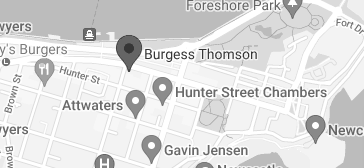Independent Legal Advice
Property & Conveyancing
Our Legal Team are with you every step of the way
When there are multiple parties involved in a legal matter it is important to seek independent legal advice. An individual involved in any matter should seek legal advice separate to others involved. In order for your document to be enforceable in court, it should be accompanied by a signed certificate authenticating that independent legal advice has been provided. For example, Financial Institutions such as Banks may require a guarantor to obtain independent legal advice before they formally approve a loan application.
Burgess Thomson are happy to provide independent advice to their clients when needed in a legal matter. We can provide advice regarding loan and mortgage documents and explain the rights and obligations of a guarantor. We will take care to ensure you have a full understanding of the agreement you are signing.
GET A QUICK QUOTE
Enter your details for an obligation free quote.
Find out more about how we can help Buying Property.
FAQ's
Who should seek independent legal advice?
Any individual entering into a legal agreement or signing a contract should seek independent legal advice. It is important for the individual to have a clear understanding of the document and conditions in which they are involved. It is also important to understand the potential ramifications of being a guarantor in a binding and enforceable agreement. A lawyer is able to provide the client an objective review of the document and ensure that they have not been pressured into signing anything without sound understanding.
What is involved in getting independent legal advice?
When providing legal advice, your solicitor will need to read through all documents in question and meet with you to discuss your reasons for entering into the agreement. If you are then satisfied with the conditions of the document you are required to sign a statutory declaration that states you have received independent legal advice. All matters discussed and your statutory declaration is kept on record for future reference.
What is a guarantee?
A guarantee is a binding agreement between a lender, borrower and a guarantor. The guarantor makes a promise to the lender to pay the debt owed by the borrower if the borrower cannot do so. Many parents make personal guarantees on their children’s home loans to help their children enter the property market. This is sometimes referred to as a Family Security Guarantee. As a guarantor you make be required to offer you assets, such as your house or car, as security for the loan. If the borrower defaults, the lender would be able to sell your assets to reclaim the debt.
What are the risks of being a guarantor?
One of the main risks is that if the borrower cannot make their monthly loan repayments, you may be required to pay instead. If the borrower defaults on the loan, the lender will most likely sell their assets first in order to recover the debt. However, if there is a shortfall, your assets could also be claimed by lender.
Acting as a guarantor may also mean that your ability to borrow may be reduced. This may be the case even if the borrower can repay the loan. You may also need the lender’s approval if you wish to sell property which has been offered as a security.
It is also important to consider that if you pay money to the lender, you may be unable to reclaim it from the borrower. If the borrower cannot afford to pay the debt, it is unlikely they will be able to pay you back.
It is also possible that you could end up with a bad credit report if both you and the borrower cannot pay back the guaranteed loan.
What if the borrower is a company?
If you are considering providing a personal guarantee for a company, there are extra things to consider. You should ensure you are aware of things such as the company’s ownership, structure, finances and forecasted revenue. You will want to ensure that the company is in a good financial position with good prospects for future revenue. This will reduce the risk of you being forced to pay the debt if the company cannot.


